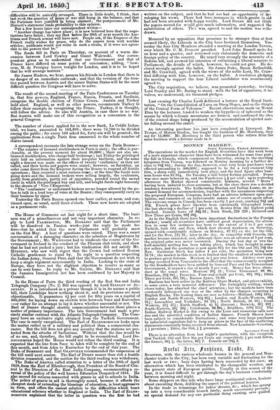In the House of Peers the third reading of the
Red Sea and India Telegraph Company (No. 2) Bill was opposed by Lord STANLEY OP AL- DERLEY. It is introduced as a private though it is in its nature a public bill, their Lordships know nothing about it, and its provisions are most objectionable. It guarantees 4 per cent for fifty years on a capital of 800,000/. for laying down an electric wire between Suez and Kurrachee —or rather for an attempt to lay it down whether successful or not. The Earl of DERBY thought electric communication between those places a matter of primary importance. The late Government had made a pre- cisely similar contract with the Atlantic Telegraph Company. The Com- pany have an exclusive right obtained from the Turkish Government. Inc case is surely exceptional. The Earl of EmAtereonorem looks upon the matter rather as of a military and political than a commercial cha- racter. But the bill does not give any security that the stations are pro- tected from the attacks of barbarians. Without that the line would be of no use, and, therefore, the bill ought to be reconsidered. Lord Do- NOUGHMORE hoped the House would not refuse the third reading. It is expected that the line from Suez to Aden will be complete by the end of this month, and from Aden to Kurrachee by the end of this year. The Duke of Some:nem and Earl GitaxviLLE recommended the suspension of the bill until next session. The Earl of DERBY sooner than risk a hostile division consented, and the motion for the third reading was withdrawn. The Duke of ARGYLL called attention to a letter of the 28th of April 1868, from the Earl of Ellenborough, then President of the Board of Con- trol to the Directors of the East India Company, recommending a re- versal of the policy of the well known Education Despatch of 1854. He also moved for returns connected with grants in aid to schools in India. The policy of grants in aid is thoroughly sound, because it affords the cheapest mode of extending the blessings of education, is least aggressive in form, and offers the easiest solution to the difficulties which beset educational schemes whether in England or India. The Earl of ELLEN-. BOROUGH explained that the letter in question was the first he had written on the subject, and that he had not had an oppeitunity veloping his views. There had been instancea in which rants in aid had not been attended with happy results. Lord DERBY did not think the papers moved for would give much information, and suggested the substitution of others. Th's was agreed to and the motion was with- drawn.


























 Previous page
Previous page